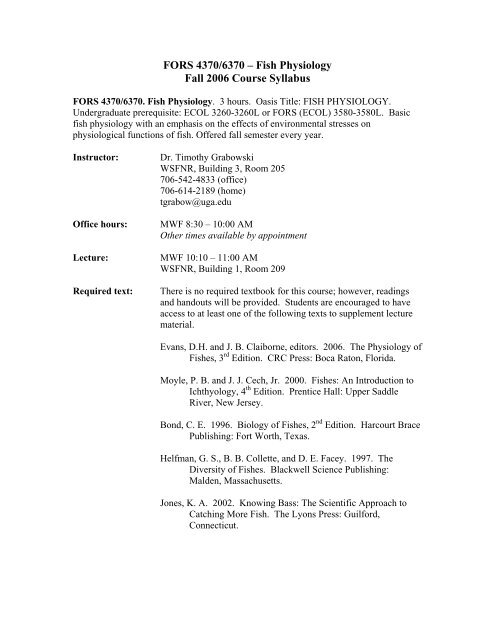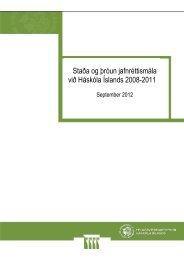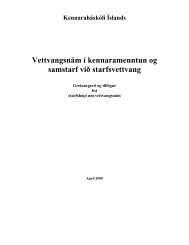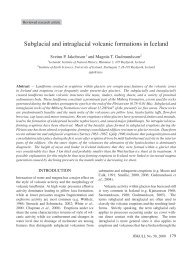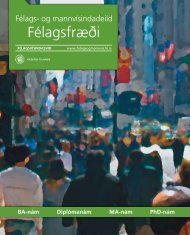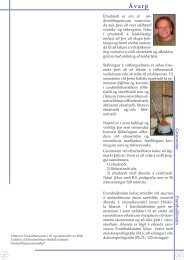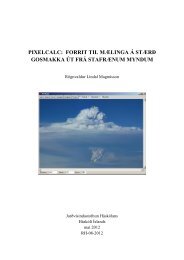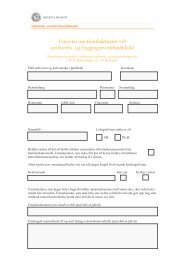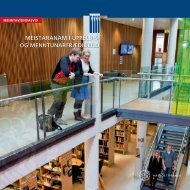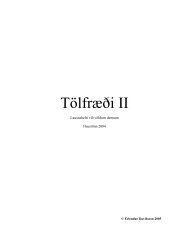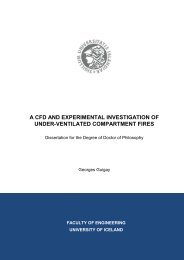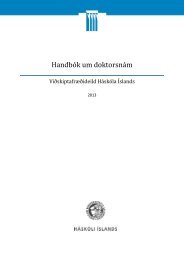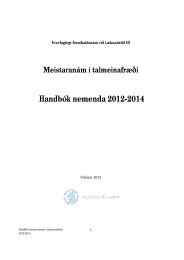FORS 4370/6370 â Fish Physiology Fall 2006 Course Syllabus
FORS 4370/6370 â Fish Physiology Fall 2006 Course Syllabus
FORS 4370/6370 â Fish Physiology Fall 2006 Course Syllabus
You also want an ePaper? Increase the reach of your titles
YUMPU automatically turns print PDFs into web optimized ePapers that Google loves.
<strong>FORS</strong> <strong>4370</strong>/<strong>6370</strong> – <strong>Fish</strong> <strong>Physiology</strong><br />
<strong>Fall</strong> <strong>2006</strong> <strong>Course</strong> <strong>Syllabus</strong><br />
<strong>FORS</strong> <strong>4370</strong>/<strong>6370</strong>. <strong>Fish</strong> <strong>Physiology</strong>. 3 hours. Oasis Title: FISH PHYSIOLOGY.<br />
Undergraduate prerequisite: ECOL 3260-3260L or <strong>FORS</strong> (ECOL) 3580-3580L. Basic<br />
fish physiology with an emphasis on the effects of environmental stresses on<br />
physiological functions of fish. Offered fall semester every year.<br />
Instructor:<br />
Office hours:<br />
Lecture:<br />
Required text:<br />
Dr. Timothy Grabowski<br />
WSFNR, Building 3, Room 205<br />
706-542-4833 (office)<br />
706-614-2189 (home)<br />
tgrabow@uga.edu<br />
MWF 8:30 – 10:00 AM<br />
Other times available by appointment<br />
MWF 10:10 – 11:00 AM<br />
WSFNR, Building 1, Room 209<br />
There is no required textbook for this course; however, readings<br />
and handouts will be provided. Students are encouraged to have<br />
access to at least one of the following texts to supplement lecture<br />
material.<br />
Evans, D.H. and J. B. Claiborne, editors. <strong>2006</strong>. The <strong>Physiology</strong> of<br />
<strong>Fish</strong>es, 3 rd Edition. CRC Press: Boca Raton, Florida.<br />
Moyle, P. B. and J. J. Cech, Jr. 2000. <strong>Fish</strong>es: An Introduction to<br />
Ichthyology, 4 th Edition. Prentice Hall: Upper Saddle<br />
River, New Jersey.<br />
Bond, C. E. 1996. Biology of <strong>Fish</strong>es, 2 nd Edition. Harcourt Brace<br />
Publishing: Fort Worth, Texas.<br />
Helfman, G. S., B. B. Collette, and D. E. Facey. 1997. The<br />
Diversity of <strong>Fish</strong>es. Blackwell Science Publishing:<br />
Malden, Massachusetts.<br />
Jones, K. A. 2002. Knowing Bass: The Scientific Approach to<br />
Catching More <strong>Fish</strong>. The Lyons Press: Guilford,<br />
Connecticut.
<strong>Course</strong> requirements<br />
Exams: (Undergraduates) There will be three exams including the final. Exams will<br />
consist of multiple choice, short answer, and essay questions. The final exam will be<br />
cumulative.<br />
Exams: (Graduates) There will be two exams (one midterm, one final). Exams will<br />
consist primarily of short answer and essay questions. Graduate student exams will be<br />
different from those given to undergraduates.<br />
Research Paper: You will submit an 8-10 page (double spaced, not inclusive of title<br />
page or references) research paper on a topic of your choice related to fish physiology.<br />
Your topic is due 08 September. If you prefer, a topic can be assigned to you by the<br />
instructor. A copy of the results of searches done for your literature review or a draft of<br />
your references section is due 29 September. A detailed outline will be due 25 October.<br />
A full draft is due 10 November. While this draft will be returned to you with comments<br />
from the instructor, it will account for 50% of your grade for the assignment. Additional<br />
comments can be provided on subsequent drafts submitted to the instructor prior to 22<br />
November. Meeting these deadlines will account for 20% of your grade for the paper.<br />
The final draft is due 01 December at 4:00 PM. Papers will not be accepted after 06<br />
December and will be penalized 10% per day (including weekend days) starting after the<br />
deadline on 01 December.<br />
Presentations (Graduate students only): You will be expected to make two 12-15<br />
minute long conference-style presentations (including Power Point slides) on subjects in<br />
fish physiology. Topics will be assigned to you; however, your suggestions will be<br />
considered. Topics will be assigned 1-2 weeks prior to presentation date. You should be<br />
prepared to answer questions on this topic after your presentation.<br />
Assignments: Throughout the course of the semester you will be assigned readings and<br />
assorted homework projects such as brief synopses on assigned subjects, preparation for<br />
discussion of assigned readings, and homework questions. These will be assigned about<br />
once per week and are designed to either provide a supplement to material covered in<br />
lecture or to highlight material likely to appear again on an exam.<br />
Participation: Participation incorporates attendance and contribution to class<br />
discussions.<br />
Grading (Undergraduate-500 pts)<br />
Exam I<br />
Exam II<br />
Exam III (final)<br />
Term Paper<br />
Assignments<br />
Participation<br />
20%<br />
20%<br />
25%<br />
20%<br />
10%<br />
5%
Grading (Graduate 500 pts)<br />
Exam I (midterm)<br />
Exam II (final)<br />
Term Paper<br />
Presentations<br />
Assignments<br />
Participation<br />
20%<br />
20%<br />
20%<br />
20%<br />
10%<br />
10%<br />
Attendance and make-up policy: Attendance is required and silent roll will be taken at<br />
each lecture. Penalties for absences and tardiness will be assessed in the class<br />
participation component of your final grade. Please inform the instructor of excused<br />
absences within 48 hours of that absence.<br />
Make-up exams will be given at the discretion of the instructor. Please inform the<br />
instructor of conflicts with scheduled exams as soon as possible.<br />
Americans with Disabilities Act (ADA): The ADA is a federal anti-discrimination<br />
statute that provides comprehensive civil rights protection for persons with disabilities.<br />
Among other things, this legislation requires that all students with disabilities be<br />
guaranteed a learning environment that provides reasonable accommodation of their<br />
disability. If you believe you have a disability requiring accommodation, please contact<br />
the University Office of Disability Services located in the Tate Student Center and each<br />
of your course instructors.<br />
Academic Dishonesty: According to the University of Georgia’s Honor Code, you “will<br />
be academically honest in all academic work and will not tolerate academic dishonesty of<br />
others.” It is the responsibility of both the students and faculty of this university to<br />
maintain academic integrity at the University of Georgia by refusing to tolerate or<br />
participate in any form of academic dishonesty. The University of Georgia Student<br />
Handbook is the standard by which academic integrity will be maintained in <strong>FORS</strong><br />
<strong>4370</strong>/<strong>6370</strong>.
18 October Endocrine System<br />
20 October Endocrine System<br />
23 October EXAM II (Undergraduates)<br />
MIDTERM EXAM (Graduates)<br />
25 October Migrations—Cues and changes<br />
Detailed outline of paper due by 4:00 PM<br />
27 October FALL BREAK – NO CLASSES<br />
30 October Reproduction<br />
01 November Reproduction<br />
Read and discuss Liu and Sadvoy (2004) and Munday et al. (<strong>2006</strong>)<br />
03 November Development<br />
06 November Nervous System<br />
08 November Nervous System<br />
10 November Electrogeneration and Electroreception<br />
Full-length first draft of paper due by 4:00 PM<br />
13 November Sensory Systems-Guest Lecture by Dr. Bob Reinert<br />
15 November Sensory Systems-Guest Lecture by Dr. Bob Reinert<br />
17 November Sensory Systems-Guest Lecture by Dr. Bob Reinert<br />
20 November Sensory Systems-Guest Lecture by Dr. Bob Reinert<br />
22 November Sensory Systems-Guest Lecture by Dr. Bob Reinert<br />
Last day to submit draft of paper for additional comments<br />
24 November THANKSGIVING BREAK – NO CLASSES<br />
27 November Stress Response<br />
29 November Stress Response<br />
01 December Physiological Responses to Environmental Contaminants<br />
Final draft of paper due by 4:00 PM<br />
04 December Physiological Responses to Environmental Contaminants<br />
Read and discuss Sumpter (1995) and Kamps & Neill (1999)<br />
06 December TBD<br />
08 December FINAL EXAM (8:00 – 10:00 AM)


